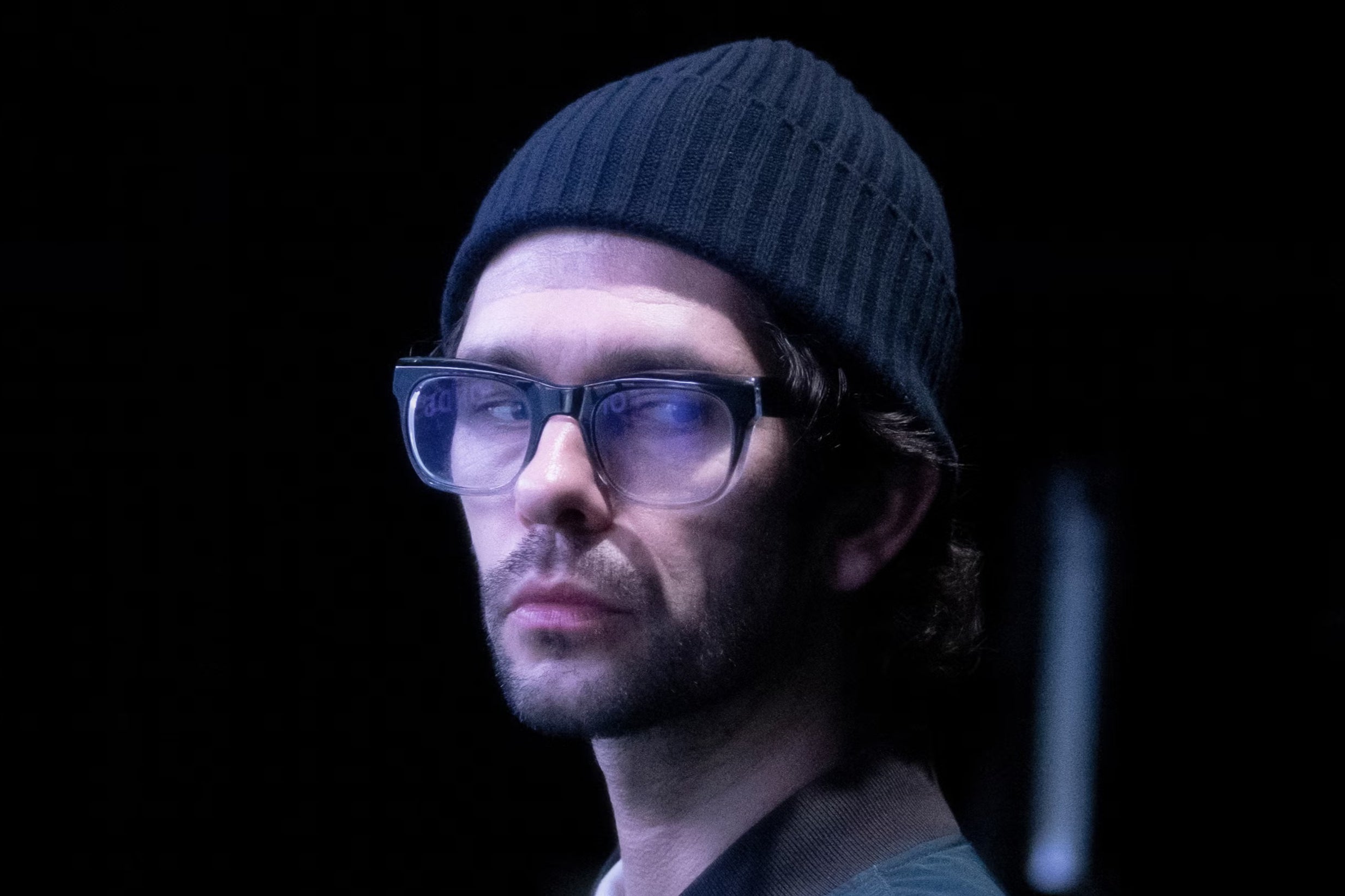Bluets review: Ben Whishaw and Emma D’Arcy lead slow, demanding production
Alienating production of Maggie Nelson’s 2009 philosophical memoir, is not a good showcase for the lead actors’ talents

It’s a bold move for the Royal Court’s new artistic director David Byrne to programme this show as the first on the main stage under his tenure: an adaptation of Maggie Nelson’s 2009 memoir-cum-philosophical-tract-cum-poetic treatise Bluets, which plants us in the mind of a heartbroken woman who falls in love with the colour blue. It’s dense and demanding, esoteric and plotless, full of references to Goethe and Catherine Millet and Derek Jarman and Heraclitus.
Then again, with Emma D’Arcy and Ben Whishaw in the cast and Katie Mitchell at the helm, it suddenly becomes a much more appealing proposition. Mitchell uses the Live Cinema approach she’s been developing for the past 20 years or so: actors stand in front of screens with moving backgrounds on them, and cameras film the actor plus background to make a kind of merged live film on an even bigger screen above.
So here we’ve got Whishaw, D’Arcy and Kayla Meikle standing in a line, each with a screen behind, each with a desk in front. Margaret Perry, adapting the book, has split the lines into shards shared between the three. When one speaks, another grabs a prop or changes clothes and sets themselves up in front of their small screen, and the big screen makes it look like they’re driving or at the Sainsbury’s checkout. They’re lightning fast as they strip off jackets, lie on pillows, swig whisky. We can choose whether to watch the shards or the composite. It’s so technically spectacular, this blend of setup and final shot, while the wash of nice words rolls over you.
It needs the skill of these three actors to carry it, but it’s not really about their acting skills individually. Yes Whishaw is a bit nervy, D’Arcy gloomy and inward, Meikle blank and bewildered, occasionally comically so. But we’re not getting to see how great they are as actors. It’s much more about the totality: the way they keep this complicated show moving with split-second precision, being in exactly the right place at exactly the right time for each other’s next scene, the way they share the lines, coming together to become this one woman who’s desperately unhappy and obsessed with blue.
We’re watching three actors create one character, three sets of actions mediated into one image on the big screen, like a prism being fed different colours and instead of merging into white light it merges into blue.
Far more surface level than in the book is the intense loneliness of the central character. You’d think that might be watered down by the fact there’s three of them on stage sharing the lines and the space. But no, it’s more so: when one actor speaks a little fragment of disconsolate thought – they’re all disconsolate, these thoughts – another is up there on the screen in a car or on a tube train, often with headphones, often with the blue light of their phone up against their eyes, looking terribly lonely. No one else in their life gets to be seen.
Perry’s adaptation necessarily sacrifices a lot from the book, but keeps many of its most beautiful lines, and having the added textures of the film, plus a fantastic ever-present score from Paul Clark and Munotida Chinyanga, creates something very different from the book, a theatrical piece unlike much else in London at the moment – a far remove, even, from the many other shows using live cameras on stage.
I suspect this will hit a lot harder for fans of the book. Anyone going in cold might find it all a bit slow, frustrating and alienating. Although there’s this technical mastershow going on, which is properly stunning, that doesn’t automatically make it a good show. Because, look, there’s no story, and an obliqueness and opacity that makes it hard to stay “in” it, and spending that much time in that person’s head with all those ponderous purple thoughts – it’s a slog, even at 80 minutes. But my goodness it’s a beautiful slog.
Join our commenting forum
Join thought-provoking conversations, follow other Independent readers and see their replies
Comments
Bookmark popover
Removed from bookmarks